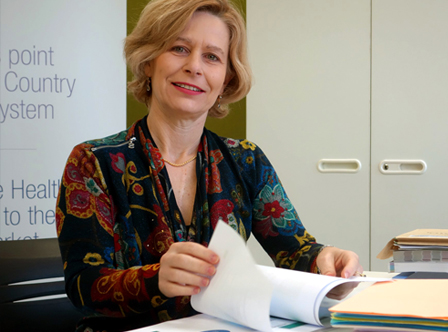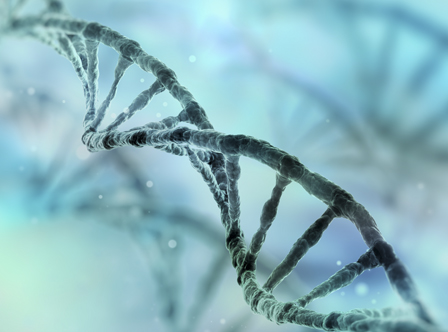INTERVIEW


The Basque Health Cluster is an association whose aim is to coordinate, represent, manage and defend the shared interests of its members in collaboration with the public authorities and other organisations within the scope of bioscience and health. It also intends to promote the development, growth and internationalisation of its members and of the health science and technology sector in the Basque Country. María Pascual de Zulueta, director of the Basque Health Cluster, explains how the sector has evolved in the Basque Country.
1.- The biotechnological sector has undergone a significant transformation in recent years. How would you describe this context in the Basque Country at this point in time?
Over the last three decades, scientific advances in the field of life sciences have given rise to a major revolution. Most of the progress made resulted from developing instrumental technologies and, more recently, capabilities related to calculus and computer software that have enabled us to analyse and process the vast amounts of data produced.
In the Basque Country, we have an outstanding mass of highly qualified researchers, cutting-edge infrastructures and equipment at our universities, technology centres, cooperative research centres and health care research centres. In a nutshell, we produce good science.
As regards the business environment, we are a young sector as 60% of our companies were established less than 10 years ago and also because we only have a relatively small number of companies totalling approximately 200. Our roots, however, are very solid as regards setting up bio-health companies and attracting business initiatives that want to find a location where financial instruments and scientific-technological initiatives are available. Support policies implemented for the sector, moreover, are producing highly positive results.
2.- The bioscience and health industries want to attract talent, improve funding and become more international. What is being done to achieve this goal?
In the Basque Country, we have well-trained professionals in bioscience and, more recently, in bioengineering. But this is not only about scientists and engineers, however, because our vocational training centres are also producing excellent professionals.
It is true that everything’s changing very quickly in this sector and that life-long training is crucial. Companies hire highly qualified workers who frequently develop their doctoral theses once working in the industry.
The difficulties faced when applying for funding become even more apparent whenever we have to address the issue of developing validations or clinical trials for our products.
The health sector has to meet extremely demanding regulatory requirements applicable to testing to guarantee product safety and efficacy. Consequently, our companies have to pay large sums to meet such stringent requirements. Having solid financial support is fundamental because clinical and pre-clinical trials take a very long time.
In addition to receiving funding in the field of health care, therefore, it is essential to be supported by people with expertise in market and business management. Thanks to the cluster, we can establish more connections between investors and companies. In fact, we hosted an investment forum last year that attracted both companies searching for funding and investors who were looking for solid projects. In view of its success, we will repeat this forum again this year.
Lastly, the international dimension of this sector must also be taken into account with regard to generating new knowledge and developing new products to be launched into the market. You will find our collaborators, suppliers, customers, investors and competitors all over the world and the success of our projects depends, to a large extent, on how well we get to know them all.
Our cluster has participated in leading trade fair exhibitions and has given support to its companies to make them more visible and ease their way into international markets. We are also promoting cross-border collaborative actions through the so-called “Gatherings for the Bio-health industries of New Aquitaine, the Basque Country and Navarre”, with our partners from GIPSO and TIC Santé clusters, Navarre companies and the Euskampus collaboration (with the Universities of Bordeaux and the Basque Country).
3.- Are there any barriers to be overcome in terms of the biotechnological sector and the development of health care devices to achieve their full capacity in the Basque Country?
Funding is the big issue. Generally speaking, and compared to developing drugs, it is cheaper and quicker to develop medical devices, although they must first demonstrate their safety and efficacy by meeting regulatory requirements that are very demanding and costly in terms of time and money.
To develop products, you must first set up a stable collaboration with the public and private health care system. To a great extent, the level of development of this sector in the Basque Country will depend on whether we are capable of establishing a collaboration between the public and private health care systems.
4.- The Basque Health Cluster has stressed that public-private collaboration must be reinforced. In this regard, what kind of contribution do you think research centres such as Tekniker are making through their specialisation in manufacturing?
We have a very rich system in the Basque Country with highly skilled science and technology agents that support companies in the execution of new developments. I’d daresay that, in our area, it is indispensable to collaborate with centres that generate knowledge and develop applications.
The sector dealing with medical devices needs the knowledge provided by different scientific and technological disciplines and this requires collaboration. Many new products are the end result of an interface between the knowledge that already exists in different specialities. We have a network made up of science, technology and innovation agents with outstanding levels of maturity and excellence and a long way to go in the future. It’s as if these agents were like an R&D&I unit in our companies that provide support to develop new products in order to make them more competitive at an international level.
Tekniker has major scientific and technical capabilities as well as a solid track record in developments related to the bio-health sector that are extremely valuable in terms of collaborative actions carried out with companies in this sector and are aimed at developing medical devices and health care products.
5.- All the technological progress made in terms of health care devices has produced major improvements in health care. How do you think this sector will evolve in the near future in the Basque Country?
In the Basque Country, like in many other regions of the world, we must address the challenge of being able to adapt our health care systems to these new times. We must incorporate new drugs as well as technological advances at a reasonable cost. If the ultimate goal is to offer an efficient universal health care system in the mid-term, we must establish new procurement models for drugs/therapies and health care products based on benefits generated for patients and/or the resulting improved economy.
Another major challenge in the Basque Country is aging which is going to produce longer lifespans that will obviously increase the demand for health care products and services. Hence, we must manage this reality properly to guarantee healthy aging for our population.



